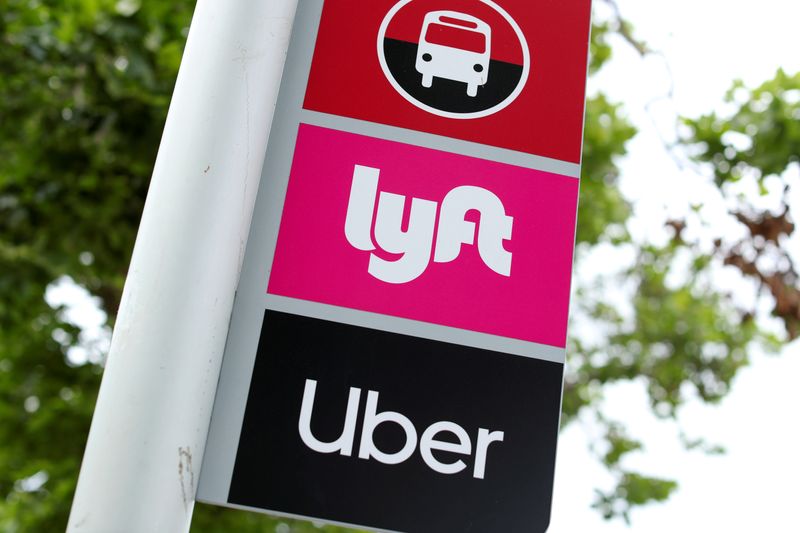By Tina Bellon
(Reuters) - Uber Technologies Inc (N:UBER) and Lyft Inc (O:LYFT) together are spending nearly $100 million on a November California ballot initiative to overturn a state law that would compel them to classify drivers as employees.
That sum looks less huge, however, than the potential costs of complying with the existing law, according to a Reuters analysis.
The two ride-hailing companies would each face more than $392 million in annual payroll taxes and workers' compensation costs even if they drastically cut the number of drivers on their platforms, a Reuters calculation showed.
(Graphic on potential price hikes - https://fingfx.thomsonreuters.com/gfx/mkt/yxmvjbwamvr/rLQlH-uber-s-california-price-hikes-if-drivers-are-employees.png)
Using a recently published Cornell University driver pay study in Seattle as a basis, Reuters calculated that each full-time driver would cost the company, on average, an additional $7,700. That includes roughly $4,560 in annual employer-based California and federal payroll taxes and some $3,140 in annual workers' compensation insurance, which is mandated in California.
The companies say they would need to significantly hike prices to offset at least some of those additional costs, which in turn would likely cause a decrease in consumer demand, but cushion the blow of the added costs to the bottom line.
Uber and Lyft have also said they could abandon the California market - an economy that would rank fifth in the world if the state were a sovereign nation. Other U.S. states have said they plan to follow California's lead and pass similar laws.
A "yes" vote on California's Proposition 22 gives Uber and Lyft what they seek, which is to overturn the state's gig-worker law, known as AB5, which took effect in January. Uber and Lyft have insisted the law does not apply to them, sparking a legal battle.
The tussle over classification of workers highlights the political and business risks facing Uber, Lyft, DoorDash and other companies that have built businesses on workers who are not classified as employees eligible for health coverage, unemployment insurance or other benefits.
Under the company-sponsored ballot measure, so-called gig workers would receive some benefits, including minimum pay, healthcare subsidies and accident insurance, but remain independent contractors not entitled to more substantial employee benefits.
POLITICAL FIGHT
The question of whether gig workers should be treated as employees has become a national issue in U.S. politics.
U.S. Democratic presidential candidate Joe Biden and his running mate, Senator Kamala Harris, have both voiced their strong support for California's labor law and directly called on voters to reject the companies' ballot proposal that would weaken it.
The campaign of U.S. President Donald Trump has not directly weighed in on the ballot measure, but the administration's Labor Department in September published proposed rules that would standardize legal definitions across the country and provide more room for companies to maintain independent contractors. U.S. Labor Secretary Eugene Scalia criticized AB5 in an opinion piece published on Sept. 22.
California represents 9% - or roughly $1.63 billion in all of 2019 - of Uber's global rides and food delivery gross bookings. However, California generates a negligible amount of adjusted earnings before interest, taxes, depreciation and amortization, Uber said in November 2019.
Lyft, which operates only in the United States and Canada and does not have a food delivery business, in August said California makes up some 16% of the company's total rides. Lyft does not break out ride-hailing revenue, but California contributed $576 million as a share of total 2019 revenue.
FEWER DRIVERS
California sued Uber and Lyft in May for not complying with AB5. The ride-hailing companies said their workers are properly classified as independent contractors, because they can set their own schedules.
The companies say the majority of their drivers do not want to be employees, and work fewer than 25 hours a week. Many drivers use the service to supplement income from other jobs.
While no legal requirements would prevent the companies from classifying part-time drivers as employees, Uber said administrative fixed costs per employee would make it more expensive to allow part-time employment. Uber said it would therefore be forced to reduce its California driver base by 76% to 51,000 full-time driver employees.
Uber also said it could reduce cash wages to offset higher benefit costs, thereby lowering the potential tax burden.
Lyft executives in court filings have said the company would have to "substantially reduce" its California driver base to a smaller number of driver employees, but has not provided a figure. The company did not respond to detailed requests for comment.
